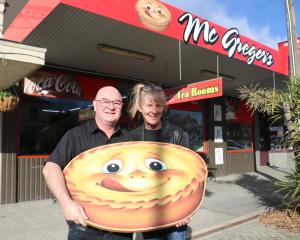
Adam Binns, director of Quantify Consulting, has been reporting the occupancy count on a quarterly basis for the past decade and says there is downward momentum.
"The last two quarters show a downward shift in vacancies. Combined vacancy levels in the Farmers, Golden and Edinburgh Way blocks sit at 9%, a drop of 2% for the year."
Retail vacancies in the Farmers block sit at 19%, down 4% for the year to date, the Golden Block has 7% vacancy, unchanged for the year, and the Edinburgh Way also has a 7% vacancy level, down 2%.
In the past six months, two new tenants — a hairdresser and a small general store — have moved into the Farmers block, a new cellphone-fixing shop has opened in the Golden Block and two additional hospitality operators are now trading in the Edinburgh Way.
While it is early days, Mr Binns suggests the Farmers block is benefiting from the completion of infrastructure and roadworks late last year.
"It stands to reason there is a direct correlation. We can only make sophisticated analysis when a few quarters have been counted because a couple of new leases can skew the picture," he said.
"But it would seem to be directly linked. I’ve spoken to a lot of business and property owners around town and haven’t heard one negative comment about the completed work in the Farmers block.
"The roadworks are having an impact on the day-to-day retail operations in the blocks where work is being done. There are fewer people in those blocks. I haven’t spoken to many retailers directly, but you only have to stand in one of the blocks where the work is being done and you can see there are fewer people."
Mr Binns noted the Farmers block was a "little different" from the others he monitored, the Farmers store accounting for a large amount of space. His methodology has a small store carrying equal weighting to Farmers when it comes to recording occupancy.
"There are fewer retail units in that block compared to the others, with the Farmers store having a bigger footprint."
The occupancy rate of the three blocks is the same as a decade ago, having ebbed and flowed over that time.
While the Edinburgh Way has "cemented itself as a hospitality location for food and beverage", Mr Binns has noticed a distinct trend to the nature of businesses opening since 2014 with more cellphone-fixing outlets and vape stores now operating.
"Vape stores didn’t exist 10 years ago and there are also a lot more phone-fixing shops around now."
Landlords have largely remained unchanged over the past decade with a small number of landlords owning a large proportion of the properties, Mr Binns said.
"Most of the landlords are professional investors and are in it for the long term. There is only a small turnover of properties, maybe fewer than half a dozen in those blocks coming on to the market each year."
He was convinced Dunedin benefited in a way the country’s larger cities didn’t.
"In Dunedin’s favour is we don’t have out-of-town retail malls like they do in the bigger cities. Having the malls centralised helps bolster our main street retail.
"I haven’t done vacancy counts in the other cities, but I would think our overall city centre vacancy levels are lower than in the other big towns for that very reason."
- By Steve Davie












